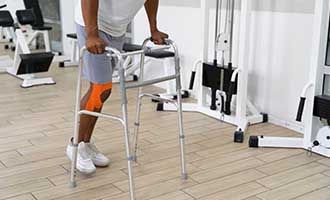Rollin' in the Greens.
Healthy Eating for Wheelchair Users

Maintaining a balanced diet and practicing healthy eating habits are crucial for overall wellness, especially for individuals using wheelchairs. Proper nutrition can enhance energy levels, support physical health, and improve mental well-being. Here are some practical tips for wheelchair users to achieve and maintain optimal health through nutrition.
1. Embrace a Balanced Diet
A balanced diet is the cornerstone of good health. Ensure your meals include a variety of food groups:
- Fruits and Vegetables: Aim for a colorful plate with a mix of fruits and vegetables to get a range of vitamins and minerals.
- Lean Proteins: Incorporate lean meats, fish, eggs, legumes, and nuts to support muscle health and repair.
- Whole Grains: Choose whole grains like brown rice, quinoa, and whole wheat bread to provide sustained energy.
- Dairy or Alternatives: Include dairy products or fortified plant-based alternatives for calcium and vitamin D.
2. Manage Portion Sizes
Maintaining a healthy weight is essential for reducing the strain on joints and improving mobility. Be mindful of portion sizes to avoid overeating. Using smaller plates, measuring portions, and paying attention to hunger and fullness cues can help manage intake effectively.
3. Stay Hydrated
Hydration is vital for overall health. Aim to drink at least eight glasses of water a day. If you find it challenging to drink plain water, try infused water with fruits or herbal teas. Staying hydrated helps with digestion, circulation, and temperature regulation.
4. Focus on Fiber
Fiber aids in digestion and can help prevent constipation, a common issue for many wheelchair users. Include fiber-rich foods like whole grains, fruits, vegetables, legumes, and nuts in your diet. Gradually increase fiber intake to avoid gastrointestinal discomfort.
5. Monitor Caloric Intake
Wheelchair users might have different caloric needs due to variations in physical activity levels. Consult with a healthcare professional or a dietitian to determine your specific caloric requirements and tailor your diet accordingly to maintain a healthy weight.
6. Incorporate Healthy Fats
Healthy fats are essential for brain health and hormone production. Include sources of healthy fats in your diet, such as avocados, nuts, seeds, olive oil, and fatty fish like salmon. Avoid trans fats and limit saturated fats found in processed foods and red meats.
7. Plan Balanced Meals
Meal planning can help ensure you get all the necessary nutrients. Plan your meals around a protein source, a complex carbohydrate, and a variety of vegetables. Preparing meals in advance can also save time and reduce the temptation to opt for unhealthy convenience foods.
8. Avoid Empty Calories
Limit foods and beverages high in empty calories, such as sugary snacks, sodas, and highly processed foods. These items provide little nutritional value and can lead to weight gain and other health issues. Opt for nutrient-dense foods that offer more vitamins and minerals.
9. Adapt Your Kitchen
Make your kitchen wheelchair-friendly to encourage healthy eating. Ensure countertops and cooking areas are accessible. Use adaptive kitchen tools, such as easy-grip utensils, to make food preparation easier. Organize your kitchen to keep healthy options within easy reach.
10. Seek Professional Guidance
Consult with a dietitian or nutritionist who understands the unique needs of wheelchair users. They can provide personalised advice, help you create a balanced meal plan, and address any specific health concerns or dietary restrictions you may have.
Conclusion
Healthy eating and proper nutrition are vital components of wellness for wheelchair users. By embracing a balanced diet, managing portion sizes, staying hydrated, and seeking professional guidance, individuals can enhance their overall health and quality of life. Remember, small changes can make a big difference in achieving and maintaining a healthy lifestyle. Nourish your body well, and it will support you in living a vibrant and active life.
Related
-

Top Qualities to Look for in Elderly Carers in Mumbai
-

Fashion Forward: Style Tips for People with Limited Mobility
-

Wheels of Support
-

Dating with a Disability: Navigating Love, Relationships, and Mobility Challenges
-

Finding the Perfect Health Service Provider: Tips for Elderly Care
-

Slippery Roads Ahead: How to Keep Elderly Loved Ones Safe This Monsoon
-

Innovative Walking Assistance Devices for Adults
-

Tips To Empower People with Limited Mobility
-

The Ultimate Guide to Choose the Right Walking Devices for Adults
-

Rolling Through the Rain: A Monsoon Safety Guide for Wheelchair Users
-

Adaptive Fitness: Exercise Tips for Individuals with Limited Mobility
-

Enhancing Sleep Quality for Wheelchair Users
-

How Sport Rehabilitation in Mumbai Helps Athletes Bounce Back Stronger
-

In-Home Health Care Services in Mumbai Using the MobiCrew App
-

Rolling Towards Peace
-

Benefits of Hiring a Companion for Elderly Care in Mumbai
-

Physiotherapy tips for home
-

Top Benefits of Visiting a Physical Therapy Clinic
-

Focus your mind to stay healthy
-

Embracing Holistic Wellness: A Guide for Seniors and Individuals with Mobility Needs
-

Best Elderly Care Apps for Seniors in 2025
-

The Role of Hydration in Health and Wellness
-

Beyond the Wheelchair: Why Emotional Support Is Just As Important As Physical Help
-

Best Physical Therapies in Mumbai for Post-Operative Recovery
-

How to Choose Reliable Mobility Services at Home in Mumbai
-

The power of Pilates
-

The Importance of Wheelchair Assistance for the Elderly
-

Breathing right can change your life
-

Stay in shape with Yoga
-

Best Wheelchairs for Senior Citizens in Mumbai Buyers Guide
-

Sports Injury Prevention Strategies for Mumbais Active Youth
-

How Accessible Homes Create Truly Independent Living
-

Get in the game
-

Choosing the Right Care Taker Services in Mumbai for Your Needs
-

Understanding the Benefits of In-Home Elder Care for Loved Ones
-

How to Choose the Right Sports Rehab Treatment Clinic Near You
-

Why Routine Health Check-Ups Matter for Wheelchair Users
-

Tips to Choose the Right Physical Therapist for Your Needs
-

How to Help People with Disabilities: A Guide to Inclusive Practices
-

Beginners, chair cardio is the way to go!
-

Understanding Spina Bifida: Symptoms, Types, and Early Detection









